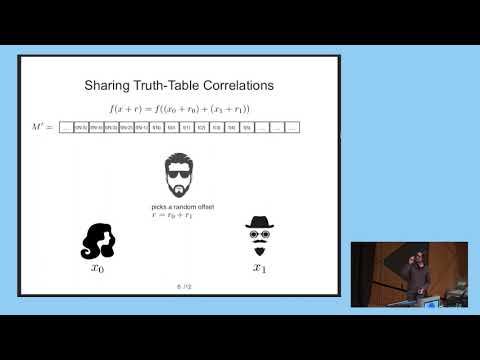CryptoDB
A Note on the Communication Complexity of Multiparty Computation in the Correlated Randomness Model
| Authors: | |
|---|---|
| Download: |
|
| Abstract: | Secure multiparty computation ( $$\mathsf {MPC}$$ MPC) addresses the challenge of evaluating functions on secret inputs without compromising their privacy. A central question in multiparty computation is to understand the amount of communication needed to securely evaluate a circuit of size s. In this work, we revisit this fundamental question in the setting of information-theoretically secure $$\mathsf {MPC}$$ MPC in the correlated randomness model, where a trusted dealer distributes correlated random coins, independent of the inputs, to all parties before the start of the protocol. This setting is of strong theoretical interest, and has led to the most practically efficient $$\mathsf {MPC}$$ MPC protocols known to date.While it is known that protocols with optimal communication (proportional to input plus output size) can be obtained from the LWE assumption, and that protocols with sublinear communication o(s) can be obtained from the DDH assumption, the question of constructing protocols with o(s) communication remains wide open for the important case of information-theoretic $$\mathsf {MPC}$$ MPC in the correlated randomness model; all known protocols in this model require O(s) communication in the online phase.In this work, we exhibit the first generic multiparty computation protocol in the correlated randomness model with communication sublinear in the circuit size, for a large class of circuits. More precisely, we show the following: any size-slayered circuit (whose nodes can be partitioned into layers so that any edge connects adjacent layers) can be evaluated with $$O(s/\log \log s)$$ O(s/loglogs) communication. Our results holds for both boolean and arithmetic circuits, in the honest-but-curious setting, and do not assume honest majority. For boolean circuits, we extend our results to handle malicious corruption. |
Video from EUROCRYPT 2019
BibTeX
@article{eurocrypt-2019-29369,
title={A Note on the Communication Complexity of Multiparty Computation in the Correlated Randomness Model},
booktitle={Advances in Cryptology – EUROCRYPT 2019},
series={Advances in Cryptology – EUROCRYPT 2019},
publisher={Springer},
volume={11477},
pages={473-503},
doi={10.1007/978-3-030-17656-3_17},
author={Geoffroy Couteau},
year=2019
}

